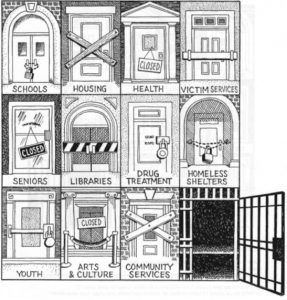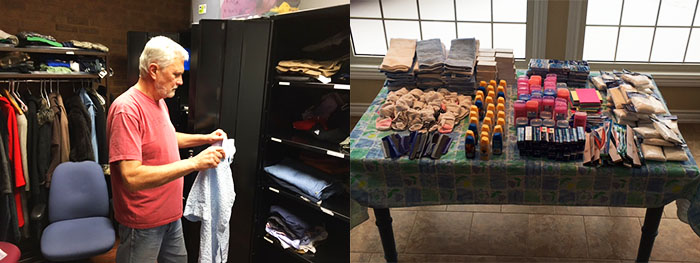
![]() Canadian Quakers believe that justice must be compassionate and focus on how to heal rather than how to punish. This is what's called “penal abolition” (PDF).
Canadian Quakers believe that justice must be compassionate and focus on how to heal rather than how to punish. This is what's called “penal abolition” (PDF).
The worldwide community of Quakers has worked on concerns related to justice for over 350 years. These stem originally from experiences in the seventeenth century of being imprisoned for our beliefs.
Our work and beliefs about transformative justice
CFSC promotes responses to crime that actively prevent harm, repair harm, and move beyond harm throughout the criminal justice system. We do this in ways that balance the needs of all parties and are concerned for society as a whole. We actively promote alternatives to prison and encourage the use of restorative and rehabilitative practices.
We take action in the following ways:
- Public education through workshops, resources, and facilitating dialogues;
- Policy influence through consultations and engagement at the Canadian and international levels;
- Providing small community grants to support local grassroots organisations;
- Researching and monitoring key issues; and
- Working in partnership with justice networks and organisations to clarify, strategise about, and act on our beliefs.
Currently, CFSC has two priorities in the criminal justice system: the impacts on children and youth when their parents are incarcerated, and the benefits of Restorative Justice and alternatives to prisons.
Moving from systems that harm to systems that heal

Seeking the Truth by Leah Dockrill, featured in Understory Magazine Issue 8: Women and Justice, supported by a CFSC grant.
In 1981, Canadian Quakers became the first religious body to call for the abolishment of prison. Friends adopted a minute (PDF) that stated in part:
The prison system is both a cause and a result of violence and social injustice. Throughout history, the majority of prisoners have been powerless and oppressed. We are increasingly clear that the imprisonment of human beings, like their enslavement, is inherently immoral, and is as destructive to the cagers as to the caged.
…
Prison abolition is both a process and a long-term goal. In the interim, there is a great need for Friends to reach out to and to support all those affected: guards, prisoners, victims, and families.
The minute also recognized “a need for restraint of those few who are exhibiting dangerous behaviour” but called for the restraint to be humane. Learn more about Friends' historic position on abolishing prisons. (The minute and background are also available in French.)
Penal abolition acknowledges that the harm caused by prisons comes from the systemic focus on punishment. Changing this mindset means transforming harmful approaches to ones that are healing.
The term “penal” originates from the Latin and Greek words for punishment, and to “punish” is to cause suffering. It is the suffering inherent in the justice system that Quakers wish to abolish—for victims, perpetrators, institutional staff, families, and communities.
Our 2016 article Revenge (PDF, pages 3 and 5), examines the roots of the concept of vengeance and how this continues in our modern criminal justice system.
Restorative justice
Transformative justice uses the power unleashed by the harm of a crime to let those most affected find truly creative, healing solutions. Transformative justice includes victims, offenders, their families, and their communities, and invites them to use the past to dream and create a better future.
—Ruth Morris in Stories of Transformative Justice (2000)
CFSC supports Restorative Justice and rehabilitative practices as an alternative to prisons and a punitive criminal justice system. Restorative Justice acknowledges that criminal behaviour causes harm to victims, communities, and also offenders. Rather than punishing an offender, CFSC encourages the use of practices that focus on healing and restoring community balance, including structural injustices that lead to crime and inequality.
For decades we have been active in supporting Restorative Justice initiatives such as the Alternatives to Violence Project, Circles of Support and Accountability, and volunteering in local prisons. For instance, here is Toronto Friend Keith Maddock talking about his experience volunteering for 20 years in the Don Prison in Toronto:
Here is Joy Morris talking about her upbringing and her Ruth Morris' work in promoting transformative justice:
CFSC also engages in education and policy work in Restorative Justice through our partnerships with the National Associations Active in Criminal Justice, the Church Council on Justice and Corrections, the Canadian Criminal Justice Association, the Canadian Coalition for the Rights of Children, the Canadian Families and Corrections Network and the Collaborating Centre for Prison Health and Education at the University of British Columbia.
Penal abolition workshops
CFSC hosts informal workshops on penal abolition and how to engage in criminal justice issues. We aim to work with people to better understand the justice system in Canada, how our beliefs lead to penal abolition, what this means, and how we can envision alternatives to prisons. If you are interested in CFSC conducting a workshop for you, please contact us.

Don McCaffrey of Yonge Street Monthly Meeting and the essentials kits provided by the Helping Hands Project at Newmarket Court, Ontario 2017
Community grants
CFSC provides community grants to encourage projects that engage in transformative justice issues and align with our values and ways of working. We provide approximately $500 to two or three applicants per year.
How to apply
If you want to apply for a grant, please read our Guidelines and Proposal Requirements (PDF) and email your completed application to us as described in that document. We review applications as they come in.
Past grant recipients
- Books 2 Prisoners Ottawa, a working group of the Ontario Public Interest Research Group at Carleton University, to send donated reading materials and write letters to incarcerated individuals in Canada and the United States.
- Restorative Justice Housing Ontario to provide safe, sustainable, and affordable accommodation and a supportive community to recently ex-incarcerated persons.
- Freeing the Human Spirit to teach yoga and meditation, and promoting mind and body awareness among Canada’s incarcerated population.
- Candace House-Nourishing the Heart Program to offer access to holistic and culturally appropriate resources and referrals as well as victim support services in a way that promotes empowerment and resilience.
- Communitas Montreal for a scholarship program aimed at supporting the successful reintegration of those who have spent time in prison.
- The John Howard Society of Ontario to assist the development of Unlocking Change, an interactive project examining the criminal justice system through the lens of mental illness.
- The Yonge Street Monthly Meeting Helping Hands Project to provide essential kits to people released from court without their belongings (read an article about this work).
- The Alternatives to Violence Project to begin AVP programs in prisons in Ontario.
- The Seventh Step public forum and training session, which aimed to support the reintegration of offenders through the implementation of self-help groups.
- The Canadian Families and Corrections Network to reprint Parent-Child Activity Sheets
- Understory Magazine, an online magazine of literary writing and visual art by and about Canadian women, to assist with a special issue on the theme of women and justice.
- Dorothy and Gerald Vandering for an art show and workshops titled Ripped Apart or Stitched Together at the 2014 National Restorative Justice Conference in Banff.
- Concilio Prison Ministry (Nova Scotia) towards the costs of Spring House, which addresses the needs of families visiting the federal prison located in Springhill.
- Women's Shelter (Toronto) to assist with transportation for women and their children to a counseling program for children exposed to violence.
- Canadian Families and Corrections Network (Kingston) for the republishing of Time’s Up: A reintegration toolkit for families and other resources for families of offenders.
- Elizabeth Fry Society of Peel-Halton (Ontario) to assist with the establishment of an Elizabeth Fry office in Newmarket, Ontario and for a Criminal Lawyer Duty Counsel Emergency Fund to help those released by the court to return to prison to retrieve their personal belongings.
- Telltales Media towards the production of a documentary ‘Til the Cows Come Home about Kingston’s prison farm.
- Initiatives for Just Communities (Winnipeg) for development of a database for the Open Circle Program.
- Mennonite Central Committee Canada for a Maritime tour of the play Forgiven/Forgotten by the theatre troupe Theatre of the Beat that addresses issues of crime and our responses to those affected by crime.
- Moncton Community Chaplaincy (New Brunswick) towards A Circle of Support and Accountability (COSA) Fredericton start-up.
- Alternatives to Violence Project (AVP) Victoria (British Columbia) Area Council of AVP-Canada for workshop focusing on trauma.
- Instruments of Change Society (British Columbia) for workshops and activities related to the Ladies Rock Camp in women’s prisons.
- A column on peace and nonviolence in the Out of Bounds prison magazine.

